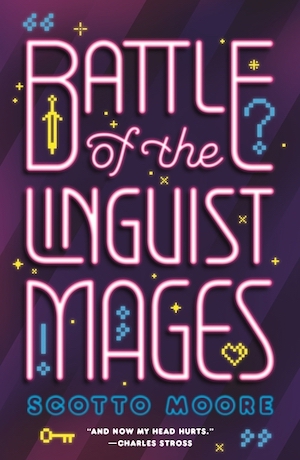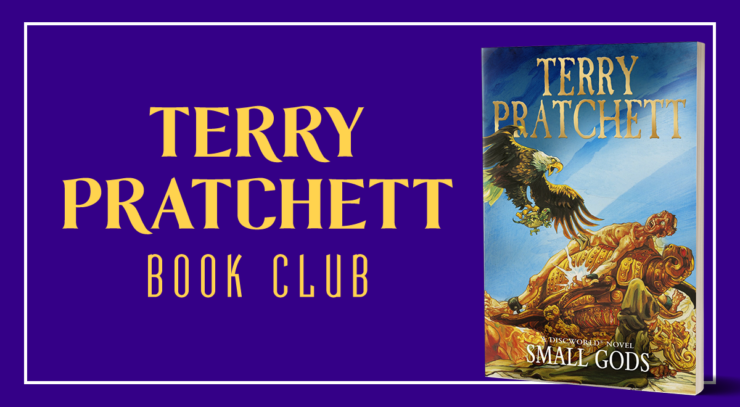It’s time to eat some melon and have another chat with some Small Gods.
Summary
Fri’it arrives at his afterlife: He must set out across a desert with his beliefs. He thinks that he’s no longer sure what he believes, only to discover that isn’t true at all. Brutha travels with the caravan alongside Vorbis. He notes the soldiers traveling a mile behind on many camels, which Vorbis instructs him to forget. They board a boat to Ephebe, and Vorbis asks questions of the captain on deck, which leads to a conversation about porpoises. The captain makes the mistake of uttering a superstition that the souls of dead sailors become porpoises, and in order to prove he doesn’t believe such things, Vorbis insists that he kill one for them to eat. Om keeps urging Brutha to kill Vorbis, telling him about how the exquisitor laid him onto his back to roast. Brutha can’t think of any scripture that says cruelty to animals is prohibited. (There’s an aside about Koomi, a philosopher who wrote that gods had to be believed in to exist; the Omnian Church had him killed for this insistence.) The death of the porpoise is going to cause a storm, and Om is worried about dying in a shipwreck, so he prays to the Queen of Sea; she is mortified to have been summoned by a “small god.” Om insists that he has rights, even as a god with only one believer, and requests that she save the ship. The Queen of the Sea cannot refuse, but gets to name a price for such an act and promises that it will be high.
Buy the Book


Battle of the Linguist Mages
Sailors grab Brutha and intend to throw him overboard; the sea wants a life, and he’s the closest person they can find. Brutha asks to pray to his god beforehand and they give him ten seconds. In that space of time, the Sea Queen stops the storm around their ship and they sail out of it. They continue on the sea for days, the crew having a wary respect for Brutha after the incident. The captain sees a light in the desert and tells Brutha to inform Vorbis. Vorbis tells him to ask for the captain’s mirror and shine it toward the desert. Om dreams and remembers his beginnings, first speaking to a shepherd and gaining his first hundred followers in Ur-Gilash. The captain of the ship tells Brutha that despite what Om’s religion (and Vorbis) says, the world is flat, that he’s seen it. Om confirms this to Brutha, insisting that he never claimed to make the world. Brutha reports to Vorbis about how many flashes he saw from the desert and in what pattern.
They arrive at Ephebe and Brutha is startled to find that the Ephebians look like people rather than demons. He’s also startled at the statues of various gods, who Om can name and explain and also insists are just as real as he is. They all stop for a wet naked man named Legibus who runs into a shop to get a pot and string; he’s a philosopher, and they have the right of way in Ephebe. They are brought to a palace and blindfolded to get led through a labyrinth (but of course, Brutha remembers exactly how many paces it takes to get in, and in what directions). On the other side they meet Aristocrates, secretary to the Tyrant of Ephebe. They are given quarters and food, which Vorbis considers a taunt because this is a fast day. Om tells Brutha it isn’t and he can eat, then tells him to go out into the city and find a philosopher so he can find out about gods. They head into a bar where a group of them are fighting and ask the bartender, who insists they don’t come cheap, but mentions Didactylos as an option—he lives in a palace, so back they go. The next day, Brutha is called with Vorbis to meet the elected Tyrant of Ephebe, who is finishing the treaty that he intends them to sign, not discuss. Om finds Didactylos.
Vorbis insists that they pause the treaty negotiations until tomorrow. Brutha meets one of the slaves in the palace and asks about his life, then Vorbis gives Brutha permission to look anywhere in the palace as his eyes and ears. He goes to look for Om, who is busy helping Didactylos and his nephew Urn earn money by giving other palace dwellers something to bet on. Brutha asks Didactylos the questions Om is looking for answers to, and the philosopher takes him to the Library of Ephebe. Brutha sees things he’s never encountered before; art and images and maps and philosophy. Didactylos knows they’re blowing his mind a little, and tells him that he went to Omnia once, before he was blind, and saw people stoning a man in a pit—and notes that it’s the people who did the stoning that he found horrifying. Brutha is given a scroll on gods and hurries away, but Urn knows he saw Brutha in the tavern last night… which shouldn’t be possible because of the labyrinth.
Commentary
We’re at the beginning of an awakening for Brutha, as he’s being rapidly introduced to a world of new concepts and ideas. It’s described on the page as the awakening of a prophet, but this manner of awakening applies to all sorts of people on having their worldview widened. He’s got it from both sides as well, from both the god Om who keeps challenging the scripture he holds as gospel to the completely different way of life he finds in Ephebe.
There’s reference to many different figures of philosophy—Socrates, Archimedes, Descartes, Diogenes, the list goes on—and we’re also getting an introduction to the part politics will play in this story as we begin the treaty negotiations. But key to the middle of all this is the persistent disinformation that Brutha is slowly beginning to unravel.
The fact of that new awareness is easy to empathize with from Brutha’s standpoint, drawing comparisons between plenty of global religious sects who isolate their followers in order to ensure obedience. The gambit of these particular groups follow the rule that exposure to even the idea of heresy will promote heretical thought and perpetuate heresy, so the very idea of anything outside the community is demonized. This even extends to the point of other living beings; Brutha is shocked to find that the Ephebians are just normal people, who don’t seem particularly dangerous and certainly not devious forces of evil.
The pointed, though unspoken, key point is: Brutha is Om’s only true believer. We’re told as much, which means that all authorities that Brutha has been listening to—Vorbis in particular—are not believers at all. And this is where philosophy comes in and kinda crashes the party, right? Because from the standpoint of a faithful person, that is the most important aspect: The people who do these terrible things, who keep other people in the dark, they aren’t people of faith at all, even if they believe themselves to be. They are not representative of the religion, and they shouldn’t be counted as such. But from the standpoint of an atheist, that distinction isn’t likely to hold water: If the people in charge of an entire religion or religious sect are using it to hurt other people (and believe they are acting in interest of the faith), then the net result is horrible enough that maybe you should just abandon the whole thing.
The book is pointing to this disagreement without taking a side in it, just by its very structure. And we’re watching Brutha’s concept of the world unravel in realtime, particularly when he almost has a panic attack in the library over what people like Didactylos do, replacing the sureness of his upbringing with endless questions and ruminations on said questions:
And these bumbling old men spent their time kicking away the pillars of the world, and they’d nothing to replace them with but uncertainty. And they were proud of this?
His discomfort with that idea is countered by Didactylos telling the story of his experience watching Omnians stone a man to death. And what the old man found distressing about that scene wasn’t the man’s death, but rather that the people throwing those stones weren’t sure that person deserved death: What they were sure about was that they weren’t the ones in the pit being stoned. His point is that the people of Omnia are not good or fair, but afraid. So what is better? Fear or uncertainty? When are they the same thing, and when are they different?
My favorite thing about this section are all the little details that Brutha notes as “pointless” or “puzzling” that actually do have purposes. And again, they’re slipped into the narrative without commentary, just constant tweaks to how ignorance can warp your perception of what you see. For example, Brutha notes that there are beams in the library that are carved, and as far as he’s concerned, those beams have no purpose. But they’re either art, or a form of braille for Didactylos to find scrolls within the library, or possibly both. They do have a purpose; he just doesn’t have enough knowledge to perceive it.
Asides and little thoughts:
- Pratchett’s footnote about running if you wind up in the power of a person who says things like “Commence” or “Enter” makes me wonder what he would make of Captain Picard’s standard “Come,” or all the people in Starfleet who use “Enter” when people show up at their doors. I’m guessing he’d still stand by the statement, of course. It is pretty damned unnerving.
- The Ephebian statues are all described as white stone, but to be more accurate to historical Greeks, they should be painted! To my understanding, this knowledge didn’t become part of discourse available to the general public until the 1980s or ‘90s, and has really only gained ground in the past twenty-ish years or so. Plenty of folks never learn about it at all, so it’s always a good reminder to add into any conversation about classical statuary.
- I really do appreciate the shout out to the chain letter as a fear tactic: The Tyrant talks about Omnian tactics as a letter that chains men’s minds, then referring to it as a “chain letter,” which is a reference to the sort of letters, emails, and now social media messages that we’re all liable to be familiar with. “Send this ten people in the next hour and something terrible/wonderful will happen!” The point being that you’re either threatened to act with the possibility of trauma, or told that a lack of action means you pass up on something good. Again: fear or uncertainty?
- Of course, the Library of Ephebe is a stand-in for the Library of Alexandria, which every book/history nerd will be sad about unto the end of time.
- The bit where Om says that he doesn’t choose people, they choose themselves, has a ring of Good Omens in it. The thought is very similar to what Crowley is constantly saying: All of this is people, they create the true good and bad, the Heaven and Hell.
Pratchettisms:
You couldn’t put off the inevitable. Because sooner or later, you reached the place when the inevitable just went and waited.
You couldn’t think about how you thought. It was like opening a box with the crowbar that was inside.
“I never chose anyone,” said Om. “They chose themselves.”
For sheep are stupid, and have to be driven. But goats are intelligent, and need to be led.
And then five years later they elected another one just like him, and really it was amazing how intelligent people kept on making the same mistakes.
Next week we’ll read up to:
“Honey,” he said.
“What?”










